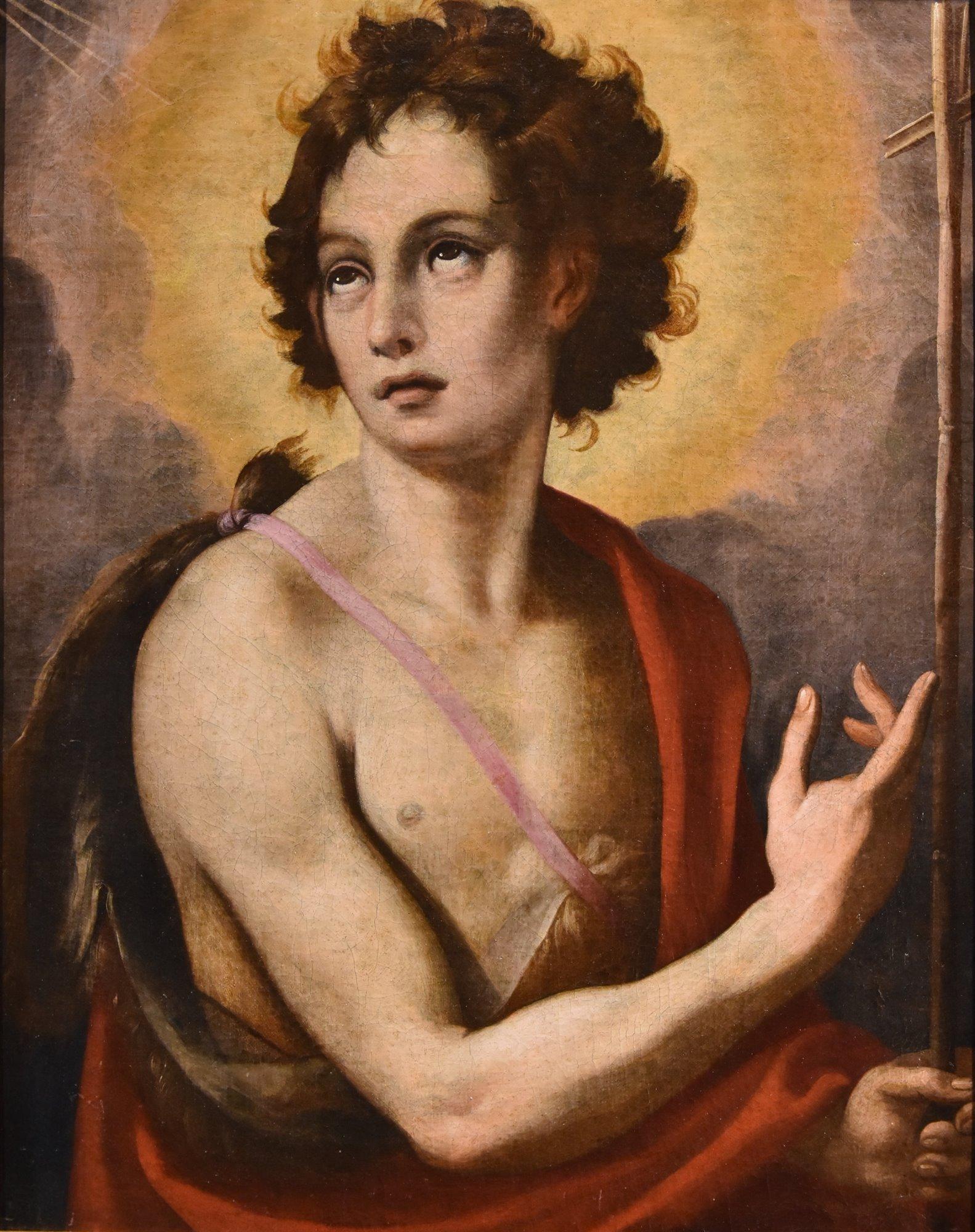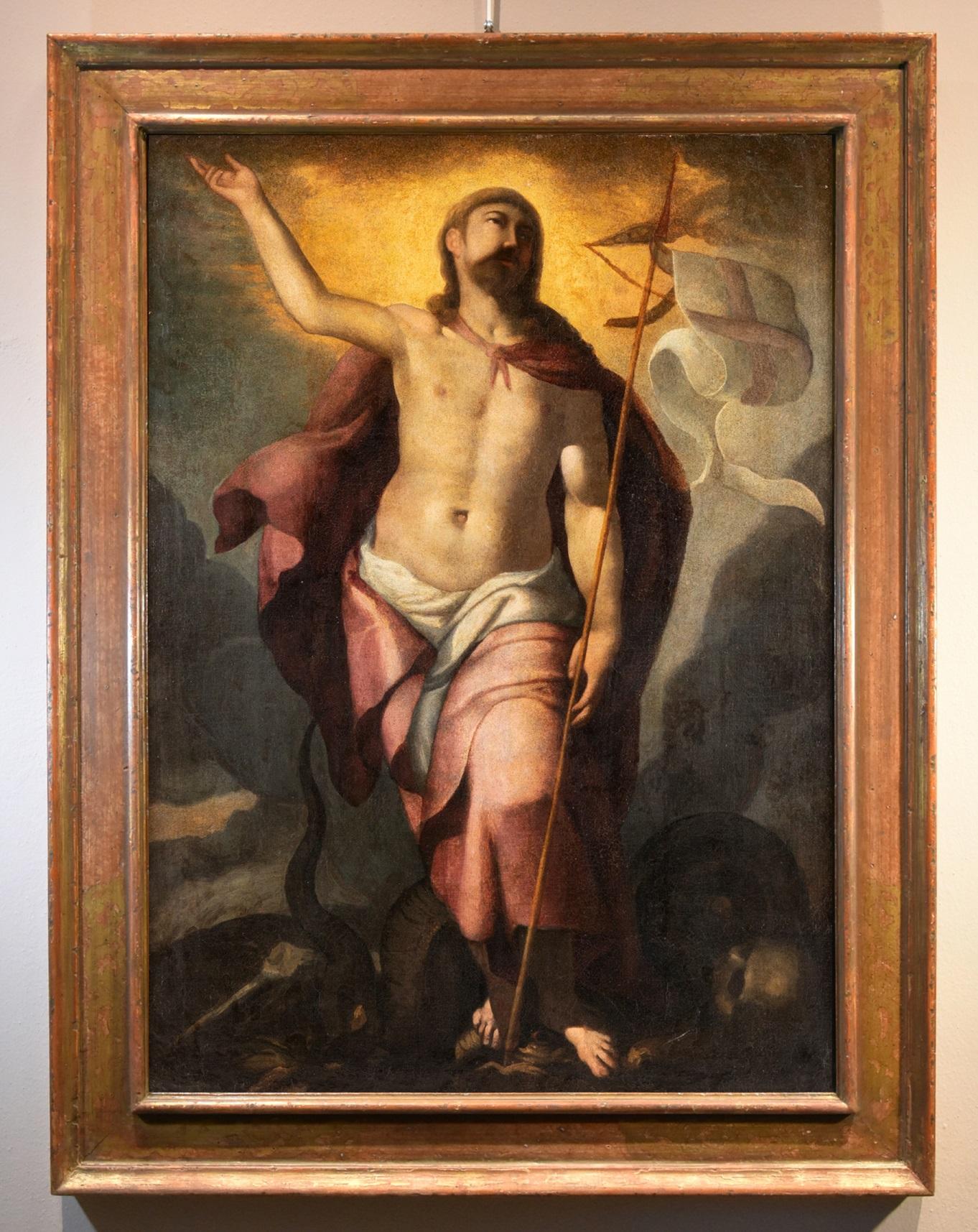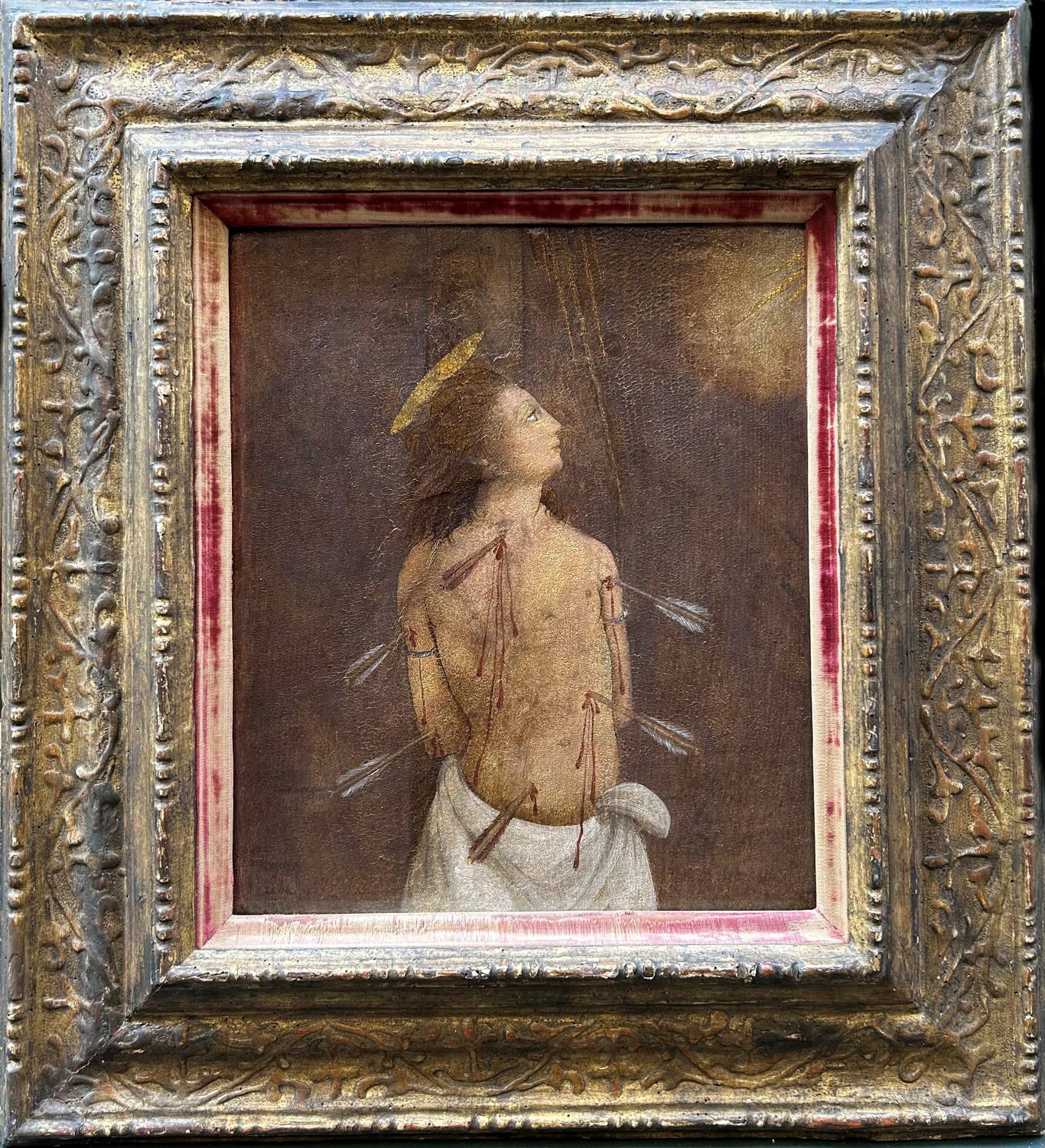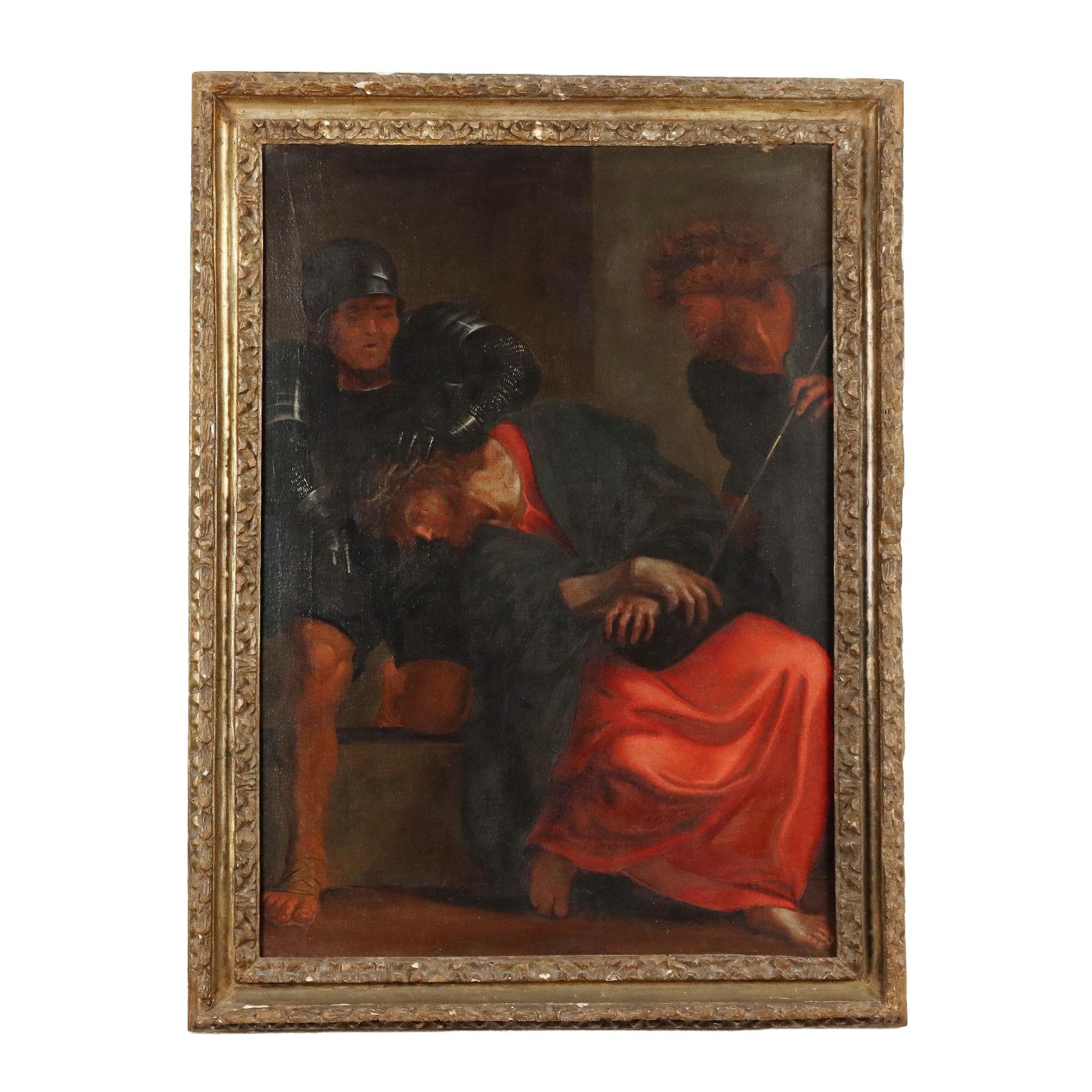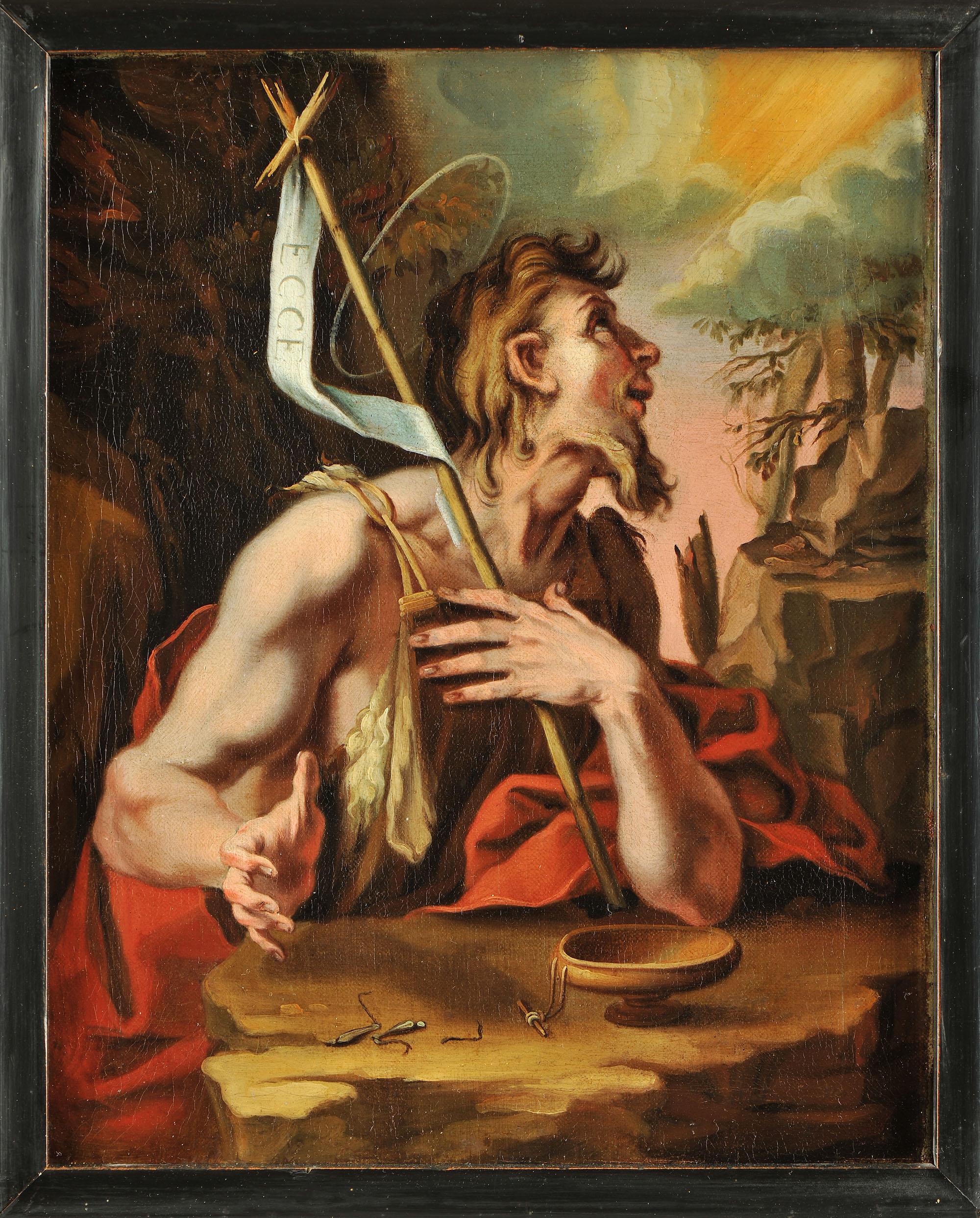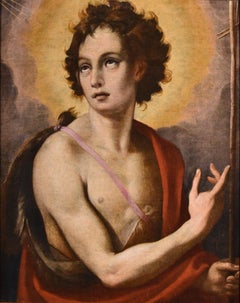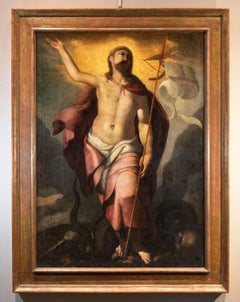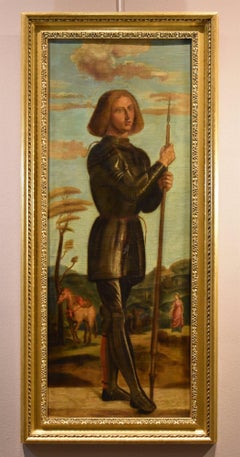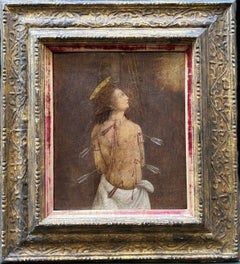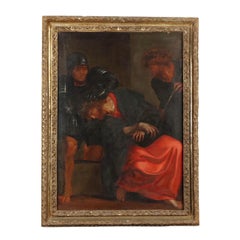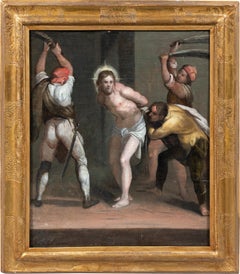Items Similar to San Sebastiano San Cristoforo Zenone Paint Oil on canvas 16th Century
Want more images or videos?
Request additional images or videos from the seller
1 of 9
San Sebastiano San Cristoforo Zenone Paint Oil on canvas 16th Century1500-1540
1500-1540
$59,125.30
£43,614.01
€49,400
CA$81,921.06
A$88,950.35
CHF 47,105.72
MX$1,090,276.45
NOK 582,951.81
SEK 550,858.60
DKK 376,075.34
About the Item
Zeno Veronese (or Zeno from Verona) (Verona, 1484 - Salò (Bs) after 1542-before 1554)
San Sebastiano and San Cristoforo
Oils on canvases, 173 x 55 cm
This pendant of works has been declared of particularly important historical and artistic interest by the Ministry for Cultural Heritage, Superintendency of Verona (decree of 22 January 2022).
In the in-depth historical-artistic report drawn up by the Ministry, following the careful material and stylistic analysis carried out and further specific investigations, the two proposed paintings, depicting San Sebastiano and San Cristoforo, are assigned to Zenone Veronese (Verona, 1484 - Salò di Brescia, after 1542 / before 1554).
The two paintings in question, depicting San Sebastiano and San Cristoforo, are painted on herringbone canvas, a particular textile support of Venetian painting.
The arched shape allows us to hypothesize with certainty the location in a religious building and that they were originally the side panels of a polyptych, probably a wooden frame (lost), which bore in the center the effigy of a saint or of the Madonna that could have been painted or carved.
A later and updated variant of the Cavriana triptych (1512) and chronologically very close to the one, commissioned by the Franciscan order, depicting the Eternal Father between two angels with Saints Joseph and Francis of Assisi (Salò, S. Bernardino, formerly in the oratory of S. Anna alle Rive) (Amaturo, Marelli, Ventura 1994, pp. 55-57, 108-102, nos. 1, 21). In fact, to date, only these two polyptychs made by Zenone Veronese are known as part of his artistic production.
Considering the posture of the bodies, the landscape, the play of light and the orientation of the gazes, San Sebastiano was placed on the left and San Cristoforo, who turns towards the outside of the canvas, on the right, in the typical act of involving the devoted bystander to join and participate in the sacred scene.
The stylistic analysis and the comparison with works of certain dating suggests that the two paintings can be traced back to the artist's maturity and dated between the end of the fourth and the first years of the fifth decade. The anatomical rendering of the nude of San Sebastiano is similar to that of the figures in the Descent to Limbo (Salò, Duomo) of 1537, while the face of San Cristoforo seems to be traced on that of San Rocco (Barghe, S. Rocco) of which it also echoes the majestic figure dressed in a short tunic and a large cloak.
The Saints are both immersed in a natural landscape, the arboreal wings and the mountainous reliefs that in the distance become blue under the sky crossed by long luminous streaks: it is a compositional structure adopted by Zeno also in the two large altarpieces of the Cathedral of Desenzano (1541) and the affinity is even more evident thanks to the comparison with the canvas depicting the Madonna with Child and the saints Cristoforo, Zeno, Antonio abate and Sebastiano di Padenghe (1542).
Despite the absence of documents relating to the provenance of the two paintings in question, it should be remembered that in 1878 in the new parish church of Bardolino, on the Veronese shore of Lake Garda, "two good paintings by Zanon of Verona" (Simeoni 1878, p. 146). The scholar erroneously indicated the dedication of the church, whose façade was still to be built, to S. Sebastiano, but it is certainly the new parish church dedicated to SS. Nicolò and Severo built on the site of the old church dedicated to S. Nicolò.
The two canvases in question could hypothetically be identified with those cited by Simoni, probably coming from the ancient pre-existing building. Having said this, it is believed that for the two paintings depicting San Sebastiano and San Cristoforo, of good executive quality, testimony of a dismembered and lost polyptych by Zenone Veronese and for the reasons expressed above, they are of exceptional cultural interest pursuant to art. 10, paragraph 3, letter e) of Legislative Decree 42/2004 and subsequent amendments In general good condition. Present scattered touches. The canvases are reupholstered.
- Attributed to:Zenone Veronese (1484 - circa 1542)
- Creation Year:1500-1540
- Dimensions:Height: 68.12 in (173 cm)Width: 21.66 in (55 cm)
- Medium:
- Movement & Style:
- Period:
- Condition:
- Gallery Location:Riva del Garda, IT
- Reference Number:1stDibs: LU988116294852
About the Seller
4.9
Platinum Seller
Premium sellers with a 4.7+ rating and 24-hour response times
Established in 2017
1stDibs seller since 2018
260 sales on 1stDibs
Typical response time: <1 hour
- ShippingRetrieving quote...Shipping from: Riva del Garda, Italy
- Return Policy
Authenticity Guarantee
In the unlikely event there’s an issue with an item’s authenticity, contact us within 1 year for a full refund. DetailsMoney-Back Guarantee
If your item is not as described, is damaged in transit, or does not arrive, contact us within 7 days for a full refund. Details24-Hour Cancellation
You have a 24-hour grace period in which to reconsider your purchase, with no questions asked.Vetted Professional Sellers
Our world-class sellers must adhere to strict standards for service and quality, maintaining the integrity of our listings.Price-Match Guarantee
If you find that a seller listed the same item for a lower price elsewhere, we’ll match it.Trusted Global Delivery
Our best-in-class carrier network provides specialized shipping options worldwide, including custom delivery.More From This Seller
View AllJesus Son Salvi Paint Oil on canvas Old master 17th Century Italian Religious
Located in Riva del Garda, IT
Ancient painting depicting Jesus with the Commissioner's son
(Alternative reading: St. Joseph with the Child, or the 'Paternity')
Giovan Battista Salvi known as "the Sassoferrato" (1609 - 1685) circle / follower
Oil painting on canvas
76 x 59 cm. -With frame in the shape of a small temple, not coeval 99 x 84 cm.
The interesting canvas that we are pleased to offer you recalls the iconographic model of classic paternity, which traditionally sees Saint Joseph holding the sleeping baby Jesus...
Category
17th Century Old Masters Paintings
Materials
Oil
$5,414 Sale Price
40% Off
Saint John Baptist 16/17th Century Paint OIl on canvas Old master Tuscany school
Located in Riva del Garda, IT
Florentine painter, 16th-17th century
Saint John the Baptist
Oil on canvas 67 x 56 cm - In frame 98 x 83 cm
In bringing out the sculptural figure of this young Saint John the...
Category
17th Century Old Masters Paintings
Materials
Oil
$9,831 Sale Price
20% Off
Resurrection Christ Tiziano 16/17th Century paint Oil on canvas Old master Italy
By Tiziano Vecellio (Pieve di Cadore 1490 - Venice 1576)
Located in Riva del Garda, IT
The Resurrection of Christ
Follower of Tiziano Vecellio (Pieve di Cadore 1490 - Venice 1576)
Venetian school of the late 16th/early 17th century
Oil on canvas
108 x 78 cm. - Framed 129 x 99 cm.
This jewel of the Venetian school, a work executed between the 16th and 17th centuries by a Venetian artist, illustrates the episode of the Resurrection of Christ: as reported in the Gospel of Matthew (Matthew 28:1-7) the event is accompanied by an explosion of light and glow, with the figure of Christ rising into the sky.
Christ's face, serene and victorious, looks up towards the Light and the Infinite, in contrast to his majestic figure, here constructed with the appearance of a classical sculpture, contrasted by an intensely luminous background.
The Risen One firmly holds in His hand the banner (white with a red cross) of the Resurrection, also known as the flag of St. George, which iconographically represents His victory over death, while raising His right hand in a blessing act. With his feet he crushes a snake and a skull, a sign of Christ's triumph over sin and death.
The painting belongs to the Venetian school and presents clear reminiscences with the works of Titian Vecellio...
Category
17th Century Old Masters Paintings
Materials
Oil
$8,090 Sale Price
20% Off
Saint George 17/18th Century Paint Cima Da Conegliano Oli on canvas Old master
Located in Riva del Garda, IT
Saint George
A follower of Giovanni Battista Cima, known as Cima da CONEGLIANO (Conegliano c. 1449 - Conegliano c. 1517)
Oil on canvas
126 x 49 cm.
Framed 143 x 65 cm.
The painting...
Category
17th Century Old Masters Paintings
Materials
Oil
$10,577 Sale Price
20% Off
Madonna Scarsella Paint Oil on canvas Old master 16/17th Century Raffaello Art
Located in Riva del Garda, IT
Ippolito Scarsella, known as Lo Scarsellino (Ferrara, around 1550 - 1620) workshop
Altarpiece depicting the Madonna and Child, St. James the Greater and the donor in armour
Technique: oil on panel
Measurements: 93 x 72 cm./with frame 109 x 86 cm.
Provenance: Prato, Farsetti, auction of 28.10.2016, lot 261 (link)
A majestic Madonna in Glory occupies the upper register of the canvas, seated on a blanket of iridescent clouds surrounded by angels, flanked by a cherub who scatters flowers contained in a cornucopia towards the infant Christ as a sign of abundance, naked and supported with both hands from the mother.
In the lower part of the composition stands the figure of San Giacomo Maggiore, one of the twelve apostles, standing on the right side of the altarpiece, represented dressed in a humble tunic; one arm holds the open Gospel book, while the other holds a cross pilgrimage staff.
A particular aspect of the table is the presence in the central part, to indicate its importance, of the figure of the donor, kneeling on a cushion, with his hands joined in prayer and his face observing the Virgin in an attitude of devotion, while on the opposite lectern is placed a prayer book; depicted with the features of a young leader in armor, with a sword and a rich iridescent red cloak, elements which, combined with his authoritarian composure, enhance his ennoblement.
Unlike the medieval altarpieces, the knight is here included in the space of the painting and has proportionate dimensions to those of the other characters, returning to all intents and purposes in the sacred scene, with a pose that cannot but evoke the detail of the 'Montefeltro altarpiece' made by Piero della Francesca for Federico da Montefeltro, kneeling in front of the sacred group in the guise of a leader.
On the right, the view recedes into depth highlighting the background of an urban landscape set on a hill behind which a mountain range stands out, with the peculiarity of the arched aqueduct that runs along the entire landscape. Presumably among these expanses were the donor's own possessions and his hometown.
It is a quality table, imbued with the late Mannerist style still resistant in the second half of the 16th century, characterized by a 'sweet and affable religiosity, rendered through a manner of studied simplicity and grace', which highlights the unmistakable stylistic and chromatic connotations of the produced...
Category
16th Century Old Masters Paintings
Materials
Oil
$10,577 Sale Price
20% Off
Saint Michael Archangel Tuscany school 16th Century Paint Oil on canvas Italy
Located in Riva del Garda, IT
Saint Michael the Archangel victorious over the Devil
Tuscany - 16th century
Oil on canvas
68 x 52 cm. - In frame 97 x 78 cm.
Of great character is this interesting St. Michael the...
Category
16th Century Old Masters Paintings
Materials
Oil
$9,333 Sale Price
20% Off
You May Also Like
Saint Sebastian, 15th Century Religious Oil Painting on Panel
Located in London, GB
Oil on panel
Image size: 16 x 13 1/4 inches (41 x 34 cm)
Early gilt frame
Saint Sebastian was a Roman centurion who converted to Christianity and, in punishment, the Roman Emperor D...
Category
15th Century and Earlier Italian School Figurative Paintings
Materials
Oil, Panel
Religious Subject Oil on Canvas Italy XVII Century
Located in Milan, IT
Oil painting on canvas. It is a vintage copy of the engraving of the same name made by Annibale Carracci (1560-1609), which had immediate success and gave rise to a series of printed replicas and painted copies. It presents the moment of the Passion in which Christ is crowned with the crown of thorns, the object of torture, the disparaging symbol of his proclamation as King of Kings. The act is performed by two figures, the Roman soldier and the Jew, representing the two people who they took part in Christ's death sentence. The figures, vigorous and sanguine, those of the two tormentors paler and more inert than the victim, create an intertwined composition of bodies, with that of the central Jesus joining the other two, uniting them in the shared responsibility of what they are doing; placed sideways, Jesus has his head bent forcibly to the left by the soldier who imposes the crown of thorns on him, while the Jew on the right places the bamboo cane in his hand, replacing the scepter. The scene is dominated by gloomy and dark colors, among which only the bright red of Christ's robe stands...
Category
17th Century Other Art Style Figurative Paintings
Materials
Oil
Fenzoni, Painting AND preparatorial Drawing, John the Baptist, Italy Renaissance
By Ferrau Fenzoni
Located in Greven, DE
The painting and the preparatory drawing are offered together.
Provenance
Private collection, Germany, Trier, c. 1980- 2013
Saint John the Baptist
Brown ink and wash over red chalk on oatmeal paper
31 x 20.5 cm
Inscribed: „Ferrau Fenzonio da Faenza invt. esque … imp. da Fran. Villamena …“.
bears the collector's mark of Henry Scipio Reitlinger (1882-1950; Lugt 2274a) on a tiny label glued to the verso
On the reverse is a partial drawing of a Pieta, pricked for transfer.
Provenance
New York, Doyle, 14. October 2015, No. 6
The painting and the preparatory drawing resemble the composition of an engraving after Ferraù Fenzoni by Francesco Villamena. Drawing, engraving and painting are almost identical, except for minor differences. Even the measurements nearly correspond: painting (32 x 25,5 cm), drawing (30 x 20,5 cm), engraving (31,1 x 23,5 cm).
Dr. Guiseppe Scavizzi confirmed the attribution of the present panting to Fenzoni and he dates it to c. 1590.
The inscription on the drawing reads “Ferrau Fenzonio da Faenza invt. esque. . . imp. da Fran: Villamena . . .”. The engraving’s inscription also lists place and date “Ferra Fensionius inventor/F. Villamoena sculpsit Rome/Aspectu fruitur… antra puer/cum Privilegio… 1613”.
Interestingly, the engraving is not mirrored as it is in most printing processes. Painting, drawing and engraving are not reversed but the same. It is remarkable to note that there are further paintings by Fenzoni which were engraved in the same order and not reverted. They also show strong parallels regarding the compositions and the measurements (see for example “Deposition of Christ” ).
Ferraù Fenzoni was an Italian painter mainly active in Todi. He is also called Il Faenzone after his birthplace (Faenza). He apprenticed in Rome during the papacy of Gregory XIII and contributed to numerous fresco cycles under pope Sixtus V, such as the Loggia della Benedizioni in the Lateran Palace, the frescoes on the walls and vaults of the Scala Santa of the adjacent Basilica of San Giovanni in Laterano, and the decoration in the Sistine library. His expressive canvases straddle the styles of Mannerism and Baroque. In 1594, he moved to Todi. A “Last Judgement” by him is housed in the cathedral of Todi. He returned to Faenza in 1599, where he decorated chapels in the cathedral from 1612 to 1616. In 1622, he completed a “Deposition”, now in the local Pinacoteca. In 1640, Fenzoni was named “cavaliere dello speron d’oro” by Cardinal Colonna and, on 25th April 1634, he was nominated vicar and “castellano of Granarolo”.
Fenzoni‘s style is characterized by a mixture of the Mannerism of the Northern Netherlands and the Italian Baroque.
Saint John the Baptist, Old Master, 17th Century, By Fenzoni, Religious Scene, Rome Art...
Category
16th Century Mannerist Figurative Paintings
Materials
Canvas, Oil, Handmade Paper
Ferrau FenzoniFenzoni, Painting AND preparatorial Drawing, John the Baptist, Italy Renaissance, 1590
$28,718 Sale Price
25% Off
Perin del Vaga workshop (Florence) - 16th century figure painting - Flagellation
Located in Varmo, IT
Piero di Giovanni Bonaccorsi, known as Perin del Vaga (Florence 1501 - Rome 1547), workshop of - Flagellation of Christ.
71.5 x 59.5 cm unframed, 89 x 76 cm with frame.
Oil on pane...
Category
16th Century Renaissance Figurative Paintings
Materials
Panel, Oil
$5,984 Sale Price
37% Off
17th Century By Guidotti aka Cavalier Borghese Salomé and the Baptist Oil/canvas
Located in Milano, Lombardia
Cavaliere Paolo Guidotti, also known as il Cavalier Borghese (Lucca, Italy, 1559 - 1629)
Title: Salomé and the Baptist
Medium: Oil on canvas
Dimensions: without frame 90 x 68.5 cm -...
Category
Early 17th Century Old Masters Figurative Paintings
Materials
Oil, Canvas
16th Century by Venetian Maestro Deposition of Christ Oil on Panel
Located in Milano, Lombardia
16th Century Venetian Maestro
Title: Deposition of Christ
Medium: Oil on panel
Dimensions: without frame 40 x 25 cm
Formerly Canesso Collection, Paris.
Fairs: The International Biennial of Antiques in Florence 2022 (BIAF, Biennale Internazionale dell’Antiquariato di Firenze)
Publications: Bozzetti, modelletti, sketches: dalla collezione di Giorgio Baratti (From the Giorgio Baratti Collection) curated by Anna Orlando, Agnese Marengo and Annalisa Scarpa, Genoa, 2022, pp. 22, 23.
In this precious panel we can admire a lament over the body of Christ by a large group of bystanders among whom we can recognise the Virgin and, in the foreground, St Catherine of Alexandria...
Category
16th Century Old Masters Figurative Paintings
Materials
Oil, Wood Panel
More Ways To Browse
16th Century Old Master Painting
Madonna With Child
Antique Effigy
Large 16th Century Oil Paintings
Francis Assisi
Lake Garda
Annas Antiques
1960s Oil Painting
Set Of Four Oil Paintings
Belgian Early 20th Century Painting
Early 20th Century Horse Paintings
Embrace Painting
Whimsical Painting
1960 Post Impressionist Oil Painting
54x54 Oil On Canvas Painting
Painting With Blue And Lavender
Oil Painting Of North Africa
Mid Century Flower Painting
